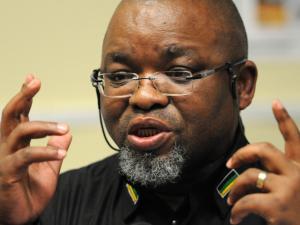
Mr Gwede Mantashe, Secretary-General of the ANC and chairperson of the South African Communist Party (SACP) was at Rhodes recently to discuss the past, present and future of the South African economy.
Addressing a capacity crowd of students, Rhodes staff, students, members of the public and the Mayor of Grahamstown, Mr Zamuxolo Peter, Mr Mantashe called for a more nuanced debate on government intervention in the country’s economy, saying the public debate around nationalisation needs to be broadened.
Describing himself as “the least worried person” about the debate, Mr Mantashe said he would like to see an expansion of the public discourse related to nationalisation to include a broader view of state intervention in the economy, shifting the focus away from nationalisation.
Acknowledging that a debate about mining will always be loaded, he urged audience members to consider broader issues related to state intervention. “This debate is not about nationalisation; it’s about the role of the state in the economy. If you want to call it nationalisation I will not spend sleepless nights worrying about that,” he said.
Calling for an end to the polarisation of the “narrow” debate, Mr Mantashe said the view that once the ANC nationalises, “there will be a state that acts like a Father Christmas” should be dispelled, adding that the ANC Youth League’s view of nationalisation differs from that of the ANC, and should not be taken to represent the opinions of the majority of ANC stakeholders.
“The (ANC) Youth League does not speak about the type of nationalisation that the government described. Nationalisation is state ownership, it’s not about grabbing from the private sector to enrich the state,” he said.
Saying that the ANC has always argued convincingly for a mixed economy involving a strong private and public sector, Mr Mantashe said the context of the debate should be acknowledged, and that we should consider what the state can do “to intervene in a number of strategic places in the country so the people of South Africa can access the services they need.”
Acknowledging that the debate has been used by certain political players as a “campaign tool for 2012”, he noted that “policy options can’t be used for convenience and elections. The day we fear saying something that is not in line with nationalisation because we are scared we won’t get elected, then that is the end of the ANC.”
Mr Mantashe said the ANC is currently conducting extensive research into the feasibility of state intervention by visiting seven countries where nationalisation has been implemented, and that the findings of the research will prove influential in the party’s decision.
Highlighting the significance of continuing an informed debate around the issue of nationalisation, he said that if the debate is not encouraged and facilitated effectively, it could lead to a worsening of unemployment, deepening poverty and growing inequality. “Any economics debate must talk to these issues that are affecting society,” he said.
Rhodes Vice-Chancellor, Dr Saleem Badat said he was encouraged by the amount of emphasis Mr Mantashe put on research and knowledge as informing action and policy implementation, as this suggests respect for knowledge and universities. He added that the vital question to consider is who will stand to benefit from state intervention in the economy.
Mr Mantashe was invited to Rhodes by the University’s Economics Student Forum.
Story by Sarah-Jane Bradfield
Picture source IOL website
